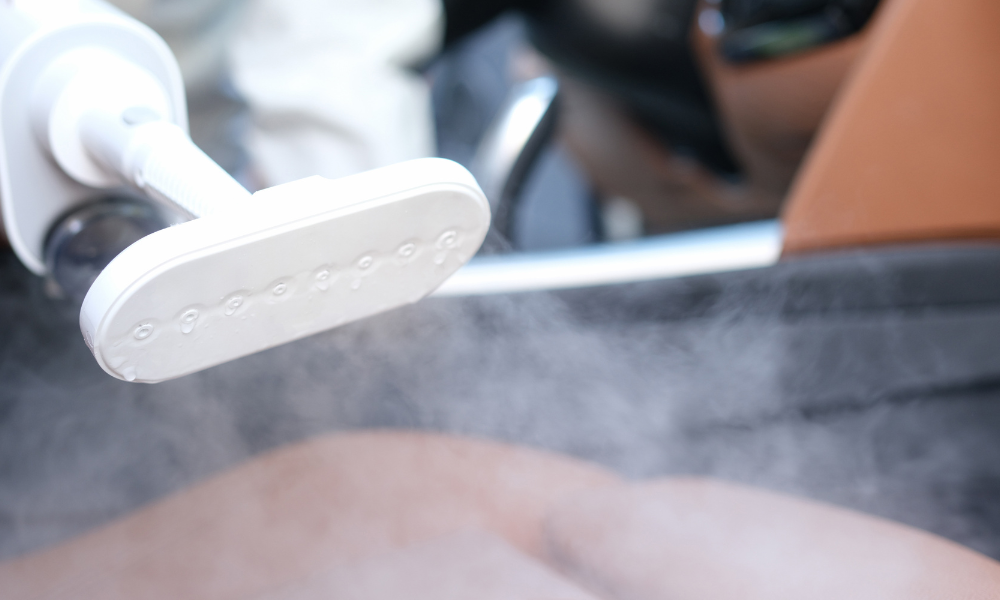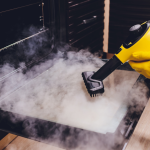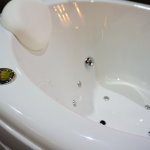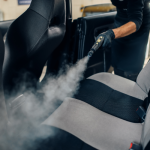Integrating the enchanting qualities of essential oils into your steam cleaning routine can significantly enhance your cleaning experience, bringing a new level of freshness and well-being. Steam cleaning is already recognized for its superior cleaning abilities, but the addition of essential oils provides an exciting enhancement. These powerful plant extracts not only fill your home with enthralling fragrances but also offer numerous additional advantages. Their natural antibacterial and antiviral qualities, coupled with mood-boosting and atmosphere-improving capabilities, make essential oils a transformative element in household cleaning.
This article delves into the extensive benefits of combining essential oils with steam cleaning, presenting a comprehensive approach to cleaning. This method not only ensures immaculate floors but also imbues your home with a rejuvenating scent. Essential Oils for Steam Cleaning | Comprehensive Guide, Advantages, and DIY Mixes
Utilizing a Steam Cleaner with Essential Oils
To fully benefit from steam cleaning with the refreshing addition of essential oils, start by filling your steam cleaner’s water tank as usual. Once the device is prepared, add a few drops of your selected essential oil to the water. It’s important to use the oil sparingly, as a small amount is quite effective. When you start the steam cleaner, the heated process will spread the essential oil-infused steam, instantly enhancing your cleaning experience with a sensory pleasure. The fragrant vapor will subtly fill the air, fostering a calming and energizing ambiance as you clean.
Advantages of Adding Essential Oils to Cleaning
Incorporating essential oils into your cleaning routine offers numerous benefits. Many essential oils have inherent antibacterial, antiviral, and antifungal properties, boosting the hygienic effectiveness of your floors without harsh chemicals. Their pleasant aromas can also reduce stress and anxiety, making cleaning a more enjoyable activity. Essential oils serve as natural odor neutralizers, successfully eliminating bad smells and leaving a lasting, pleasant fragrance. This natural approach to cleaning not only fosters a healthier living space but also aligns with a more holistic and eco-friendly cleaning philosophy.
DIY Essential Oil Cleaning Mixtures
For those interested in creating their own essential oil cleaning solutions, here are two easy recipes:
Multi-Surface Cleaner:
- In a spray bottle, combine 2 cups of distilled water, 1/4 cup of white vinegar, and 10-15 drops of your chosen essential oil (options include lemon, lavender, or tea tree). Shake well before each use. This homemade cleaner is versatile and suitable for various surfaces in your home.
Floor Cleaning Mixture:
- Blend 1 gallon of warm water with 1/4 cup of castile soap and 20-30 drops of essential oil (eucalyptus or pine are great for a refreshing aroma). Mix well and use in your steam cleaner or mop for shining, aromatic floors without chemical residues.
Adding essential oils to your cleaning routine not only makes the process more enjoyable but also promotes a healthier and more welcoming home environment. These DIY formulas offer an environmentally friendly and adaptable way to utilize the advantages of essential oils in your cleaning efforts.
Optimal Use of Essential Oils with a Steam Cleaner
When using essential oils with specific steam cleaner models such as the clam-shell or the Bissel Squeaker, it’s important to adhere to the same essential oil recommendations. These cleaners function similarly to diffusion devices. However, avoid mixing essential oils directly into the water tank as it can harm the motor of the machine. Additionally, applying oil to the mopping pad should be done with caution, as it may irreversibly damage the textile materials.
Using Essential Oils with the Fortador Volt Mini Steam Cleaner
Steam cleaners are highly efficient and versatile tools for cleaning various surfaces, offering numerous benefits:
Deep Cleaning:
- Steam cleaners use high-temperature steam that penetrates deep into surfaces, loosening dirt, grime, and stubborn stains for a comprehensive clean.
Chemical-Free Cleaning:
- Steam cleaning only requires water, offering a hygienic, germ-free, and chemical-free cleaning method, safe for families, pets, and the environment.
Effective Disinfection:
- The high heat from steam cleaners effectively kills bacteria, viruses, and dust mites, making them ideal for hygiene-critical areas.
Allergy Relief:
- These cleaners remove common allergens, improving indoor air quality and benefiting those with allergies or respiratory issues.
Versatility:
- Steam cleaners are suitable for a wide range of surfaces, including floors, upholstery, countertops, and even clothing.
Time Efficiency:
- Steam cleaning is often quicker than traditional methods, as it loosens and cleans dirt simultaneously, reducing the need for scrubbing.
No Residue:
- Steam cleaning leaves no residue, meaning surfaces stay clean longer and are less likely to attract dirt.
Reduced Allergen Exposure:
- Unlike traditional cleaning, steam cleaning captures and removes dust and allergens instead of stirring them up.
Long-Term Cost Savings:
- Though initially an investment, steam cleaners can save money over time by reducing the need for expensive cleaning products and extending the lifespan of surfaces and furnishings.
Choosing the Best Essential Oils for Home Cleaning
When incorporating essential oils into your cleaning routine, select oils that align with your specific cleaning goals, enhancing the effectiveness and aroma of your cleaning process.
- Maximizing Cleaning with Peppermint Essential Oil
Enhance your cleaning routine with peppermint essential oil for more than just its refreshing scent. Here are key reasons why peppermint oil is a great addition to your cleaning toolkit:
Antibacterial and Antifungal Qualities:
- Peppermint oil is known for its strong antibacterial and antifungal properties. Adding it to cleaning solutions can help eliminate harmful microorganisms from surfaces, offering a healthier environment without harsh disinfectants.
Energizing Fragrance:
- The invigorating aroma of peppermint oil uplifts your mood and energizes the atmosphere, combating odors and leaving your home smelling fresh and revitalized.
Insect Deterrent:
- Peppermint oil naturally repels insects like ants, spiders, and mosquitoes. Apply it around entry points like windows and doors to keep pests away.
Focus and Concentration Boost:
- Peppermint’s scent is known to enhance mental clarity and focus, keeping you alert and motivated during cleaning tasks.
Allergen Control:
- Peppermint oil helps reduce allergens by inhibiting mold and mildew growth and neutralizing airborne allergens, beneficial for those with allergies or respiratory issues.
Stain and Grease Remover:
- Effective in breaking down stubborn stains, grease, and adhesive residues, peppermint oil is especially useful in the kitchen for degreasing and appliance cleaning.
Natural Disinfectant:
- Its antimicrobial properties make peppermint oil a natural disinfectant for kitchen and bathroom surfaces, ensuring safe and clean living spaces.
Safe and Non-Toxic:
- Peppermint oil is a non-toxic cleaning option, ideal for homes with children and pets, and leaves no harmful chemical residues.
DIY Cleaning Solutions:
- Easily incorporated into homemade cleaning recipes, peppermint oil can be mixed with water, vinegar, or other natural ingredients for eco-friendly cleaning solutions.
- Benefits of Eucalyptus Essential Oil in Cleaning
Eucalyptus oil brings multiple advantages to your cleaning routine, extending beyond mere surface cleaning:
Antimicrobial Properties:
- Eucalyptus oil’s strong antimicrobial and antibacterial properties make it effective against bacteria, viruses, and fungi, promoting a healthier living space without harsh chemicals.
Respiratory Benefits:
- Its ability to clear congestion and support respiratory health makes cleaning with eucalyptus oil especially beneficial during cold and flu seasons.
Mold and Mildew Prevention:
- Ideal for damp areas, eucalyptus oil prevents mold and mildew growth, protecting against health issues and property damage.
Natural Disinfectant:
- Eucalyptus oil disinfects surfaces like countertops and frequently touched objects safely and effectively.
Insect Repellent:
- Acting as a natural insect deterrent, eucalyptus oil is useful around windows, doors, and other entry points.
Refreshing Scent:
- The fresh scent of eucalyptus revitalizes your home, combating odors and creating an uplifting environment.
Grease Cutter:
- Its ability to cut through grease makes eucalyptus oil valuable in kitchen cleaning, especially for degreasing appliances.
Child and Pet Safety:
- Eucalyptus oil is generally safe around children and pets in appropriate concentrations, reducing concerns about chemical exposure.
- Advantages of Lavender Essential Oil in Cleaning
Antibacterial and Antifungal:
- Lavender oil’s natural properties help disinfect surfaces, eliminating harmful microorganisms and promoting a hygienic environment.
Calming Fragrance:
- Known for its soothing aroma, lavender oil creates a tranquil, stress-relieving atmosphere during cleaning.
Air Freshening:
- Effective at masking odors, lavender oil leaves behind a refreshing scent, ideal for eliminating pet and cooking smells.
Insect Repellent:
- Lavender oil naturally deters pests like mosquitoes and moths, keeping your home insect-free.
Allergen Reduction:
- It helps control allergens by preventing mold and mildew growth and neutralizing airborne irritants.
Stress Reduction:
- The calming effect of lavender aroma can make cleaning a therapeutic, relaxing activity.
Stain Removal:
- Particularly effective on fabrics and carpets, lavender oil gently removes stains.
Safe for Families:
- Lavender oil is safe for use around children and pets, offering a worry-free cleaning experience.
Using Essential Oils in Car Cleaning
Essential oils can also enhance car interior cleaning with a steam cleaner. Simply add a drop beneath the seats and let the steam distribute the fragrance throughout the car, being cautious not to use too much to avoid staining.




